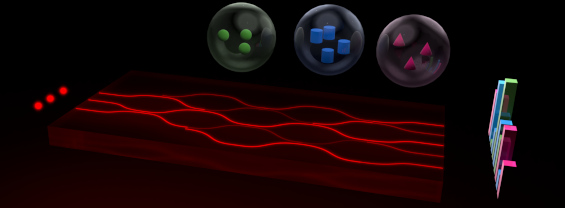Pattern Recognition Techniques for Boson Sampling Validation

Machine learning as a tool for validation of multiphoton interference Validation of multiphoton interference represents a crucial task to verify the correct functioning of photonic quantum systems, a notable example being provided by Boson Sampling devices. The Quantum Information Lab (www.quantumlab.it) of the Physics Department has performed a step forward in this direction by applying machine learning techniques to this problem for the first time. Their results have been recently published in the open-access journal Phys. Rev. X. Boson Sampling is a computational problem that consists in sampling from the output distribution produced by n indistinguishable photons evolving in a linear-optical network. Such task has been shown to be hard to tackle by using a classical computational approach, while it can be efficiently solved through an appropriate photonic quantum system reproducing this complex dynamic. The main motivation behind such complexity is due to the presence of genuine multiphoton interference Given its computational hardness and current technological state-of-the-art for its implementation on quantum hardware, Boson Sampling represents one of the most promising approaches to provide a first demonstration of quantum speedup. However, when approaching this regime, since classical simulation cannot be computed in a reasonable time, it is crucial to find appropriate methods to verify that the quantum device is working properly. Indeed, given the impossibility of classically computing the output, a direct benchmark for the data produced by a device aiming to perform Boson Sampling is not feasible. In a joint scientific collaboration with the Fast group at Istituto di Fotonica e Nanotecnologie of Consiglio Nazionale delle Ricerche, and with scientist from Microsoft Research, researchers from the Quantum Information Lab have shown that pattern recognition techniques can be an effective tool in finding hidden properties in complex data produced by Boson Sampling devices and therefore can be used to validate quantum hardware. More specifically, a data-driven approach was introduced wherein models are trained to identify specific errors in the output data by using unsupervised machine learning. This approach was tested both on numerical simulations and on experimental data obtained from integrated photonic chips. The versatility of this algorithm suggests that it may be used to validate larger systems and that it may be reformulated for a wider class of multi-particle problems.
Reference
Iris Agresti, Niko Viggianiello, Fulvio Flamini, Nicolò Spagnolo, Andrea Crespi, Roberto Osellame, Nathan Wiebe, Fabio Sciarrino
More info:
Prof. Fabio Sciarrino Dr. Nicolò Spagnolo
Pattern Recognition Techniques for Boson Sampling Validation, Physical Review X 9, 011013 (2019)
